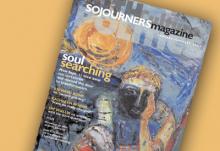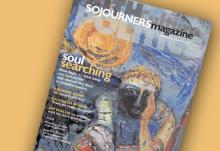I want to thank you for Jim Wallis' article "Hard Questions for Peacemakers."
Nonviolence
In light of the 9-11 wars, people worldwide are digging more deeply into the study of applied nonviolence.
From his fifth-floor window in Mennonite Central Committee's D.C. office, Daryl Byler can keep an eye on the Supreme Court while he takes calls from a press...
There’s a trap that I’d call the Bonhoeffer assumption. Dietrich Bonhoeffer was studying at Union Seminary in New York.

Some people think that if you have a position of Christian nonviolence, you don’t have anything to say because you’re excluded from making discriminating political judgments.
An individual's right to refuse active military service on the grounds of conscience is a "fundamental aspect of the right to freedom of thought, conscience, and religion..."
The Veterans of Hope video series profiles nonviolence activists from around the world.
Since 1915, the Fellowship of Reconciliation has been the most influential faith-based peace organization in the United States and, indeed, the world.
Kosovo’s peaceful leader Ibrahim Rugova has not received press attention until recently.

Young people are the keystones of any culture. Youthful energy is needed to get work done in society. We provide new ideas, physical labor, laughter, the human connection to the future and the world community, and the push for reform and change in society.
So, in the United States, why are teen-agers considered nuisances? Why do we have one of the highest youth suicide rates in the world? Why are we spending $267 billion on the military to train youth to kill, and $42 billion on all other education? How can our government claim to provide security when its priorities place young people near the bottom of an expendable pile?
This past January, 17 young adults of many faiths and nationalities came together at Kirkridge retreat center in Pennsylvania for Fellowship of Reconciliation’s Peacemaker Training Institute (PTI), a weeklong nonviolence training program to engage youth in exploring activism.
Our training provided us with the space to get to know other equally passionate young people. At Kirkridge, we met students who have started their own campus groups to address some of the root causes of violence and insecurity: poverty, homophobia, hunger, human rights abuses, and their college’s investments in the military. They have founded their own peer mediation programs, support groups for rape victims, magazines, and peace and justice radio shows.
